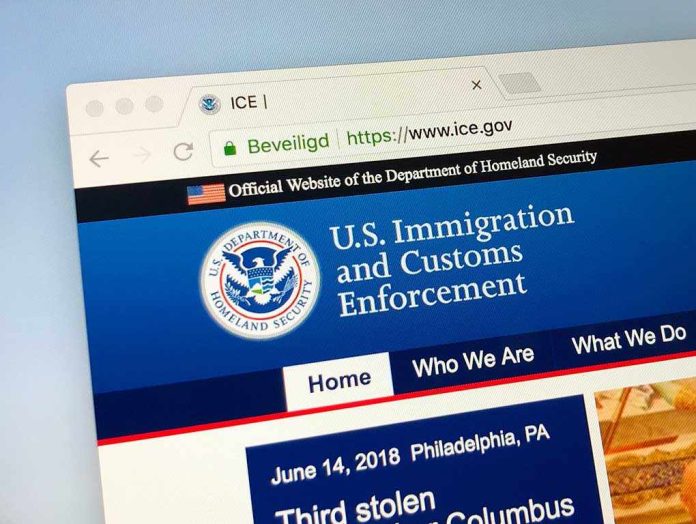
In America’s hidden detention rooms, ICE’s quiet violation of its own policies exposes a shadow system where secrecy, denial of rights, and unchecked power collide—leaving lawmakers, legal experts, and families struggling to shine a light on what happens behind locked doors.
Story Snapshot
- ICE detains immigrants in secretive rooms for days or weeks, violating its own standards and federal law.
- Expansion of detention capacity in 2023-2025 relied on private contractors and emergency powers, bypassing oversight.
- Congressional investigations, lawsuits, and media reports have exposed systemic denial of legal counsel and basic necessities.
- Senate reports detail medical neglect, preventable deaths, and growing political polarization over ICE’s practices.
ICE’s Secret Rooms: The Anatomy of a Policy Violation
ICE detention centers across the country, often in remote regions, have been quietly transformed to include undisclosed, isolated rooms where immigrants are held for extended periods. These makeshift cells, sometimes hidden from official logs, flagrantly disregard ICE’s own standards and federal law. Detainees report days or even weeks without access to legal counsel, family contact, or basic necessities, fueling an atmosphere of fear and uncertainty. The secrecy is compounded by the use of emergency powers, which allow ICE and state governments to bypass normal oversight and transparency mechanisms.
Revealed: ICE violates its own policy by holding people in secretive rooms for days or weeks https://t.co/MMmAOK7mXX
— JerryGonzalez (@JerryGonzalez93) October 31, 2025
Facility expansion accelerated in early 2023, particularly in Florida, where “Alligator Alcatraz” was constructed with little public input or environmental review. Contracts worth billions were awarded to private companies, many with scant experience in detention management. Congressional funding increases enabled ICE to ramp up mass detention and deportation efforts, often exceeding legal limits. These developments have heightened the risk of harm for detainees, placing them in legal and physical limbo while the government sidesteps accountability.
Oversight Under Siege: Lawmakers and Advocacy Groups Push Back
Congressional leaders, such as Rep. Pramila Jayapal, have demanded investigations into ICE’s contracts and the conditions within its facilities. Letters and hearings in 2024 and 2025 highlight a growing concern over runaway spending, lack of transparency, and systemic denial of legal access. Civil rights organizations, including the ACLU, have responded by filing lawsuits challenging the legality of ICE’s secretive detention practices. These legal battles focus on the denial of due process and the constitutional rights of detainees, arguing that the government’s actions set dangerous precedents for American civil liberties.
ICE and the Department of Homeland Security routinely limit access to these facilities, thwarting independent inspections and congressional oversight. State officials, like Florida’s governor, defend emergency measures as necessary for immigration enforcement, framing secrecy as a tool for national security. Critics counter that these justifications crumble under scrutiny, as mounting evidence reveals preventable deaths and medical neglect within detention centers. Advocacy groups mobilize around these abuses, pushing for systemic reform and greater accountability.
The Human Cost: Stories from Inside and the Ripple Effect
Inside these secretive rooms, detainees face isolation, uncertainty, and deprivation. Legal experts warn that denying access to counsel directly undermines constitutional rights and due process. Senate reports from October 2025 detail dozens of cases of medical neglect, many resulting in avoidable suffering and death. Families remain separated, often with little knowledge of their loved ones’ whereabouts or wellbeing, escalating the emotional and psychological toll. Social unrest grows as communities and advocacy organizations rally against what they see as a fundamental threat to human rights and American values.
The economic impact is significant. Government spending on detention contracts with private companies has soared, frequently without adequate oversight. The private detention industry flourishes, drawing criticism for its reliance on inexperienced contractors and its profit-driven approach to incarceration. The legal sector, meanwhile, scrambles to provide representation and challenge ongoing abuses, stretching resources thin in the face of systemic stonewalling. Political polarization intensifies, with immigration enforcement at the center of national debate and partisan division.
Expert Perspectives: Legal, Political, and Moral Reckoning
Legal scholars and advocacy leaders consistently argue that ICE’s use of secret rooms and denial of legal access constitutes a grave breach of constitutional rights. Congressional reports and investigative journalism corroborate allegations of secrecy, denial of rights, and expansion without adequate oversight. Policy analysts criticize the normalization of emergency powers and the growth of private detention, warning that these trends erode due process and threaten America’s commitment to transparency and accountability. Government officials maintain that national security justifies emergency measures, but the evidence points to a system where unchecked authority breeds abuse and neglect.
Multiple credible sources—Congressional statements, ACLU legal filings, and Senate reports—confirm the reality of secretive detention practices, denial of legal rights, and preventable harm. While ICE and DHS often refuse full transparency, cross-referenced investigations leave little doubt about the scale and seriousness of the problem. As lawsuits and congressional investigations continue, the nation faces a stark choice: confront the hidden machinery of detention or accept the normalization of secrecy and silence in the name of security.
Sources:
Jayapal calls for investigation of ICE detention centers and contracts
Florida’s Secretive Immigration Detention Center Explained
Congress Must Continue to Demand Access to ICE Detention Facilities
Senate report details dozens of cases of medical neglect in federal immigration detention centers



